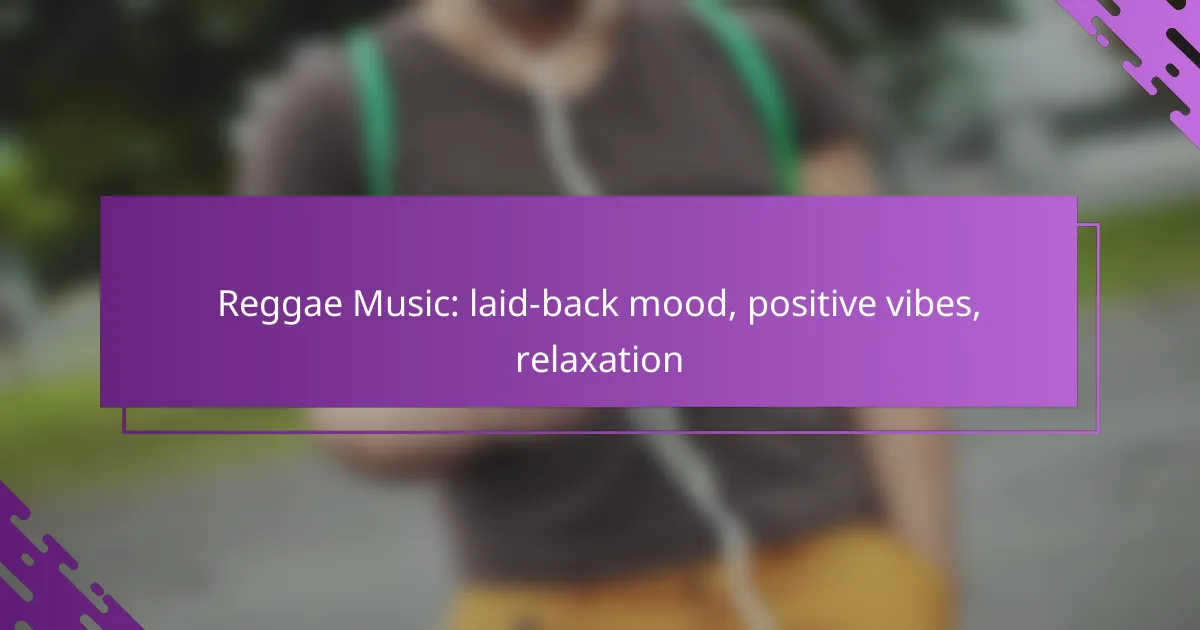Reggae music is renowned for its ability to foster relaxation and promote positive vibes through its unique rhythms and uplifting lyrics. This genre creates a soothing atmosphere that encourages calmness and enhances overall well-being, making it a perfect soundtrack for unwinding and enjoying life. With celebrated artists like Bob Marley and Peter Tosh, reggae continues to inspire listeners with messages of hope and love.

How does reggae music promote relaxation?
Reggae music promotes relaxation through its distinctive rhythms, uplifting lyrics, and soothing instrumentation. These elements work together to create a laid-back atmosphere that encourages a sense of calm and positivity.
Calming rhythms
The rhythms in reggae music are characterized by a steady, laid-back tempo, often around 60 to 80 beats per minute. This slower pace can help reduce stress and anxiety, making it easier for listeners to unwind. The offbeat guitar strumming and syncopated drum patterns create a soothing groove that invites relaxation.
Many people find that listening to reggae while engaging in activities like yoga or meditation enhances their experience. The calming rhythms can help maintain focus and promote a tranquil state of mind, making it an excellent choice for relaxation.
Positive lyrics
Reggae lyrics often convey messages of love, unity, and hope, which contribute to a positive mindset. Songs frequently address themes of social justice, peace, and resilience, encouraging listeners to adopt an optimistic outlook. This uplifting content can be particularly effective in alleviating feelings of stress or sadness.
For example, tracks by artists like Bob Marley often emphasize the importance of love and togetherness, which can foster a sense of community and belonging. Engaging with these positive messages can enhance the overall relaxation experience.
Instruments used
Reggae music typically features a blend of instruments that contribute to its relaxing sound. Key instruments include the guitar, bass, drums, and keyboards, each playing a vital role in creating the genre’s signature vibe. The bass guitar, in particular, provides a deep, resonant foundation that adds to the soothing quality of the music.
In addition to traditional instruments, reggae often incorporates elements like horns and percussion, which add layers of texture and richness. This diverse instrumentation helps create a warm, inviting sound that encourages listeners to relax and enjoy the moment.
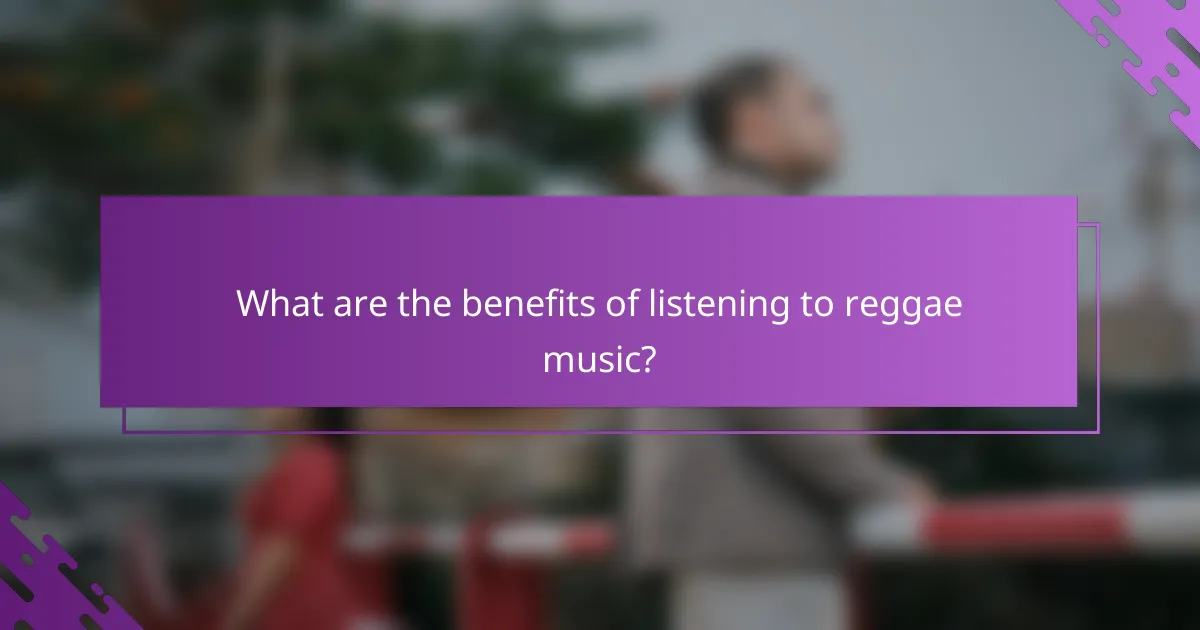
What are the benefits of listening to reggae music?
Listening to reggae music offers numerous benefits, including relaxation, stress relief, and a boost in overall mood. Its laid-back rhythms and positive vibes create an atmosphere conducive to mental well-being and social connection.
Stress reduction
Reggae music is known for its soothing melodies and rhythms, which can significantly reduce stress levels. The slow tempo and gentle beats help to calm the mind, making it easier to unwind after a long day.
To maximize stress relief, consider creating a playlist of your favorite reggae tracks to listen to during relaxation time or while engaging in mindfulness practices. Aim for at least 30 minutes of listening to experience the full calming effects.
Improved mood
Listening to reggae music can elevate your mood by promoting feelings of happiness and positivity. The upbeat lyrics often focus on themes of love, unity, and resilience, which can inspire listeners and foster a sense of hope.
To enhance your mood, try playing reggae music during social gatherings or personal downtime. Engaging with the music through dancing or singing along can further amplify these positive feelings.
Enhanced social connections
Reggae music often serves as a social glue, bringing people together through its infectious rhythms and communal spirit. Sharing reggae music with friends or attending live performances can strengthen bonds and create lasting memories.
Consider organizing a reggae-themed gathering or attending local reggae events to meet like-minded individuals. This can foster a sense of community and enhance your social network while enjoying the music you love.
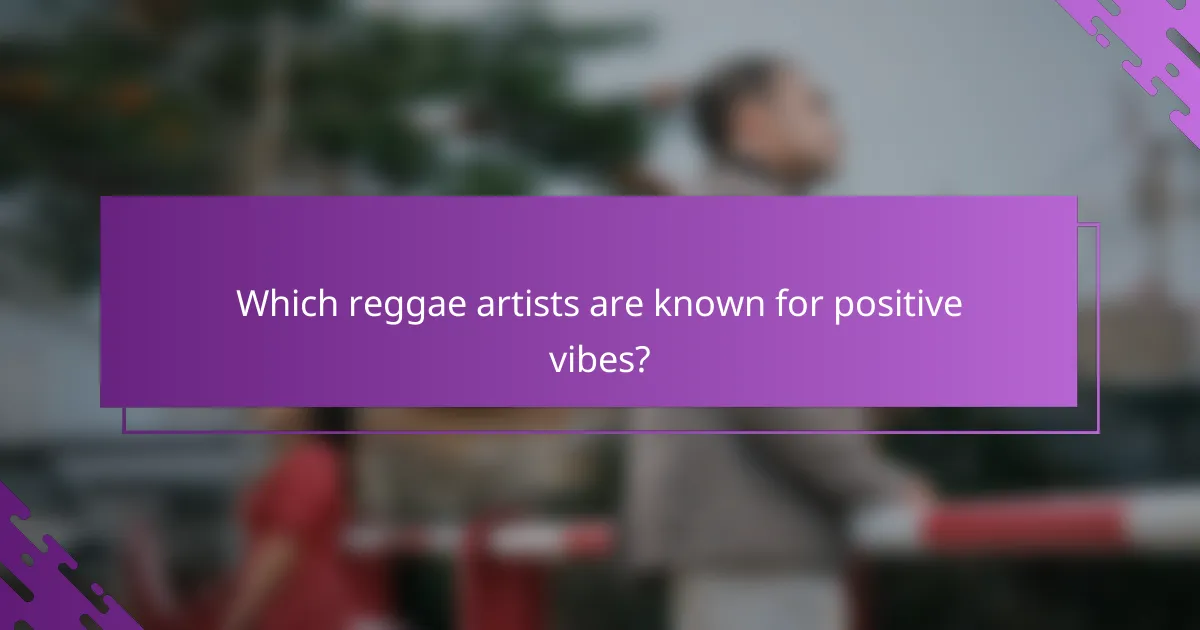
Which reggae artists are known for positive vibes?
Several reggae artists are celebrated for their uplifting music and positive messages. Notable figures include Bob Marley, Peter Tosh, and Jimmy Cliff, each contributing to the genre with their unique styles and themes centered around hope, love, and social justice.
Bob Marley
Bob Marley is perhaps the most iconic reggae artist, known for his ability to spread messages of peace and unity through his music. Songs like “One Love” and “Three Little Birds” encapsulate a laid-back mood, encouraging listeners to embrace positivity and resilience.
Marley’s influence extends beyond music; he became a symbol of the Rastafarian movement and a voice for social change. His work continues to inspire new generations, making him a timeless figure in reggae history.
Peter Tosh
Peter Tosh, a founding member of The Wailers alongside Bob Marley, is known for his powerful lyrics that often address social issues and human rights. His song “Equal Rights” advocates for justice and equality, while tracks like “Legalize It” promote a relaxed lifestyle and the benefits of cannabis.
Tosh’s music combines a laid-back vibe with a strong call for activism, making his contributions to reggae both impactful and memorable. His bold approach encourages listeners to reflect on societal issues while enjoying the rhythm of reggae.
Jimmy Cliff
Jimmy Cliff is celebrated for his vibrant and optimistic reggae sound, particularly through his hit “You Can Get It If You Really Want.” This song, along with others, emphasizes determination and the pursuit of dreams, resonating with audiences seeking motivation.
Cliff’s work often blends reggae with other genres, creating a unique sound that appeals to a broad audience. His ability to convey positive vibes through music has solidified his status as a key figure in the reggae scene.
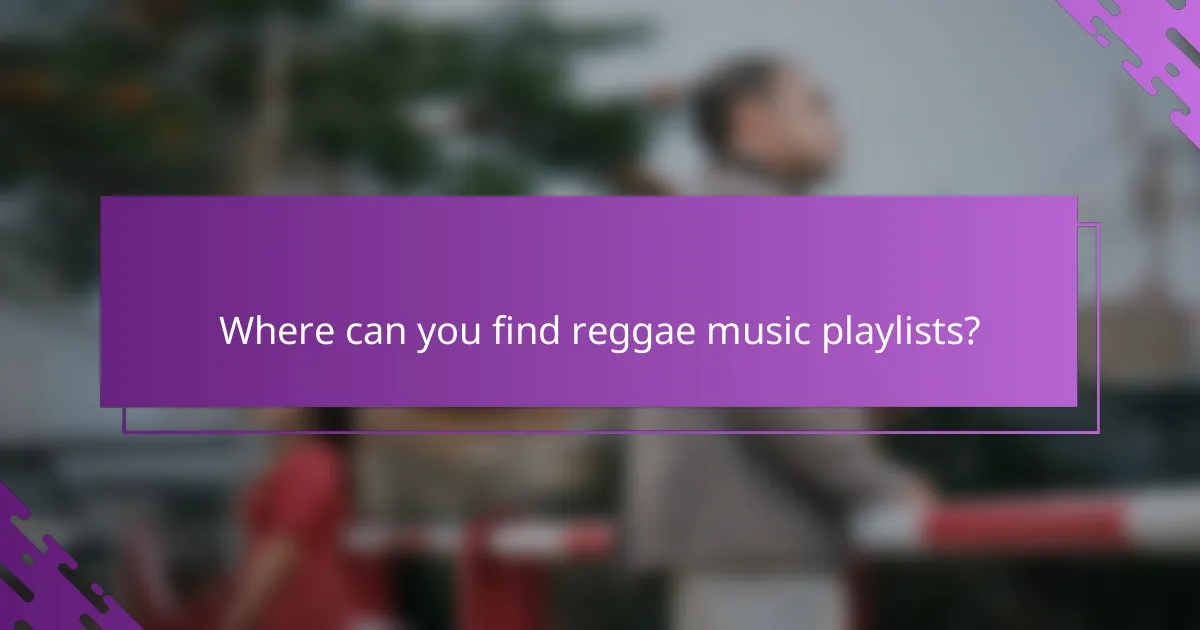
Where can you find reggae music playlists?
You can find reggae music playlists on various streaming platforms that cater to different listening preferences. Popular options include Spotify, YouTube, and Apple Music, each offering a unique selection of reggae collections to enhance your laid-back mood and positive vibes.
Spotify reggae playlists
Spotify features a wide array of reggae playlists curated for different moods and occasions. You can explore playlists like “Reggae Classics” or “Chill Reggae” to find tracks that suit your relaxation needs. The platform also allows users to create and share their own playlists, making it easy to customize your reggae experience.
To discover new music, check out Spotify’s algorithm-generated playlists, which adapt to your listening habits. This can help you find hidden gems and popular tracks that align with your taste in reggae.
YouTube reggae channels
YouTube hosts numerous channels dedicated to reggae music, offering both official music videos and user-generated content. Channels like “Reggae Vibes” and “Dub Music” provide a mix of classic hits and contemporary tracks, perfect for immersing yourself in the genre.
Additionally, you can find live performances and documentaries that enhance your understanding of reggae culture. Subscribing to these channels ensures you stay updated with the latest releases and trends in reggae music.
Apple Music reggae collections
Apple Music offers a rich selection of reggae collections, including curated playlists and albums from iconic artists. You can find themed playlists such as “Reggae Essentials” or “Roots Reggae” that highlight the genre’s evolution and key influences.
Apple Music’s integration with iTunes allows users to purchase and download individual tracks or albums, providing flexibility in how you build your reggae library. The platform also features exclusive content and artist interviews that deepen your appreciation for reggae music.
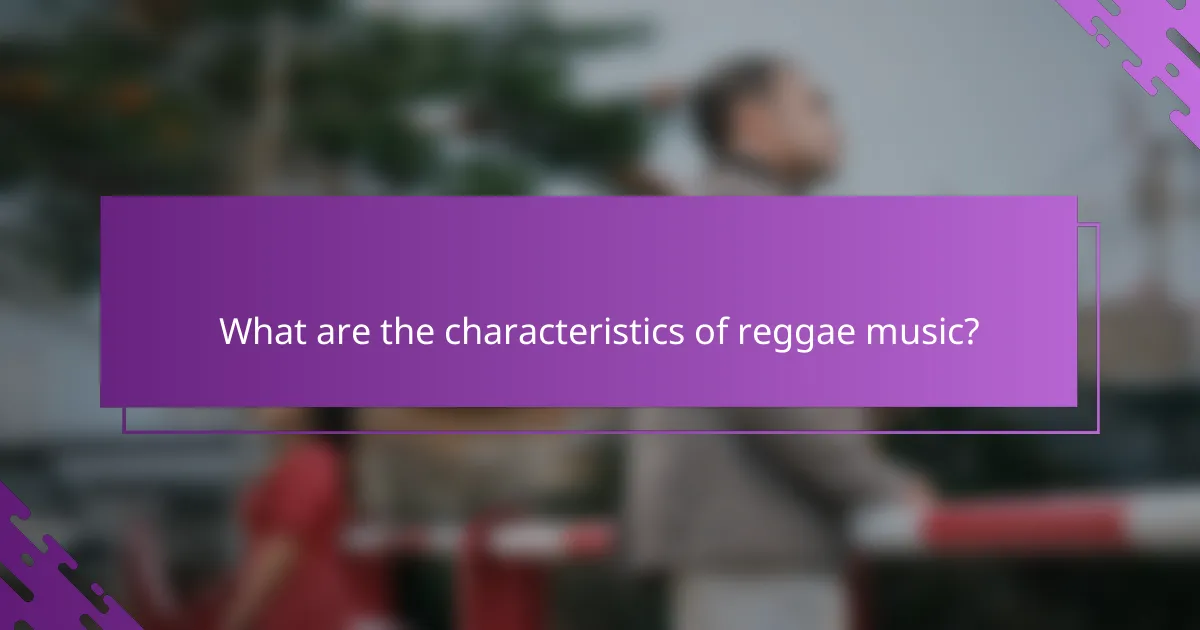
What are the characteristics of reggae music?
Reggae music is characterized by its laid-back rhythm, positive vibes, and themes of social consciousness. It often features distinctive instrumentation and lyrical content that promotes relaxation and unity.
Offbeat rhythm
The offbeat rhythm, often referred to as the “one drop” beat, is a defining feature of reggae music. This rhythm emphasizes the second and fourth beats in a measure, creating a relaxed and syncopated feel that encourages listeners to unwind.
Musicians typically use guitar or piano to accentuate these offbeats, contributing to the genre’s signature sound. This rhythmic style sets reggae apart from other musical genres, making it instantly recognizable.
Prominent bass lines
Reggae is known for its deep, prominent bass lines that provide a foundation for the music. The bass often plays a crucial role in driving the rhythm and adding depth to the overall sound.
These bass lines are usually melodic and syncopated, complementing the offbeat rhythm. They create a groove that invites listeners to relax and enjoy the music, often making reggae ideal for social gatherings and laid-back environments.
Social and political themes
Many reggae songs address social and political issues, reflecting the struggles and aspirations of marginalized communities. Themes of resistance, unity, and hope are common, often inspired by the socio-political landscape of Jamaica.
Artists like Bob Marley and Peter Tosh used their music as a platform to advocate for change, addressing topics such as poverty, injustice, and human rights. This lyrical content not only entertains but also educates and inspires listeners to reflect on societal issues.
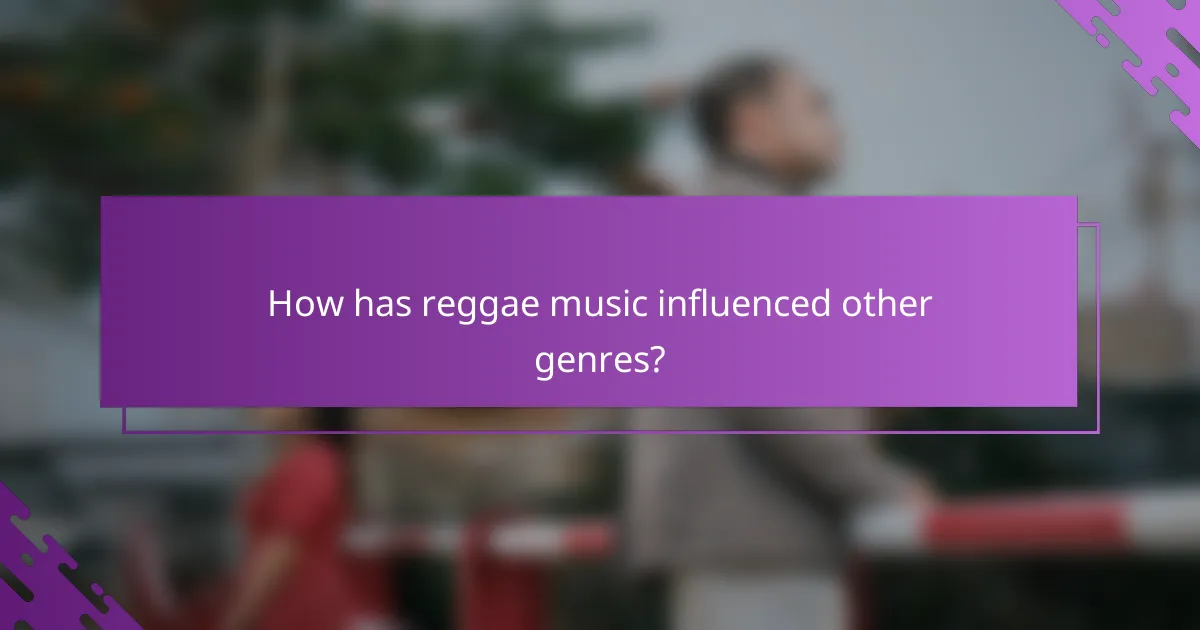
How has reggae music influenced other genres?
Reggae music has significantly influenced various genres by introducing its distinctive rhythms, themes, and instrumentation. Its laid-back vibe and positive messages have permeated hip-hop, rock, and pop culture, creating a rich tapestry of sound that resonates across diverse musical landscapes.
Impact on hip-hop
Reggae’s impact on hip-hop is evident through the incorporation of its rhythmic patterns and lyrical themes. Many hip-hop artists sample reggae tracks or use reggae-inspired beats, creating a fusion that enhances the storytelling aspect of their music. Notable examples include collaborations between reggae legends and hip-hop stars, which have helped bridge cultural gaps.
Additionally, the use of patois and reggae slang in hip-hop lyrics reflects the genre’s influence, allowing artists to connect with a broader audience while promoting messages of unity and resilience.
Influence on rock music
Rock music has absorbed reggae elements, particularly in the late 1970s and 1980s, leading to the emergence of subgenres like reggae-rock. Bands such as The Police and Sublime blended reggae rhythms with rock instrumentation, creating hits that appealed to fans of both genres. This fusion often emphasizes a laid-back, relaxed vibe, characteristic of reggae.
Moreover, reggae’s emphasis on social and political themes has inspired rock musicians to address similar issues, promoting messages of peace and justice in their lyrics.
Integration in pop culture
Reggae music has become a staple in pop culture, influencing fashion, film, and advertising. Iconic reggae artists like Bob Marley have become cultural symbols, representing not only the genre but also messages of love and social change. Their music is frequently featured in movies and commercials, enhancing emotional resonance and connecting with audiences worldwide.
Events like reggae festivals and dance parties further showcase the genre’s integration into mainstream culture, attracting diverse crowds and promoting a sense of community through music and dance.
